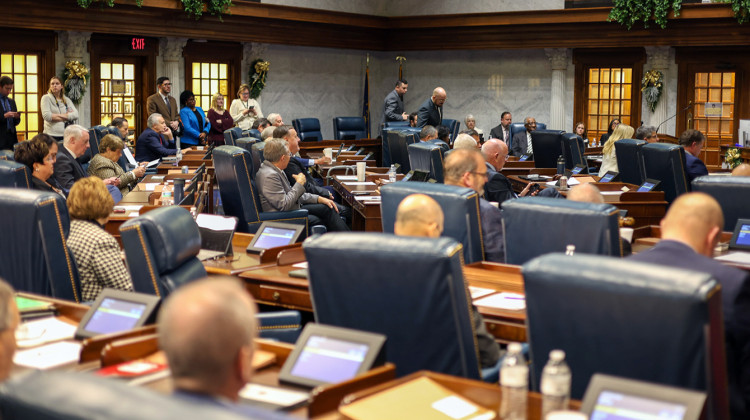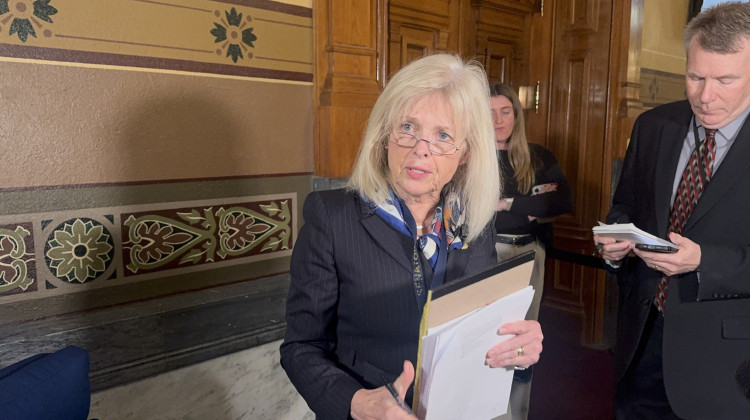This story is part of a three-part series showcasing the candidates for Indiana governor. See the Q&A with Libertarian candidate Rex Bell here and the Q&A with GOP candidate Eric Holcomb here.
Democrat John Gregg got a bit of a head start in the race for governor. He’s spent a year campaigning, while his Republican opponent only became the nominee over the summer. And that’s meant Gregg has been rolling out policy proposals for months.
Indiana Public Broadcasting’s Brandon Smith sat down with the Democratic candidate to discuss some of the specifics of those major issues in the race.
This conversation has been edited for clarity and conciseness:
Brandon Smith: Obviously you have a detailed road plan but I want to ask about — a lot of it is incumbent on bonding and borrowing. Why is borrowing the right path to go down, and aren’t we leaving ourselves open to debts in the future?
John Gregg: First of all, we’re taking $500 million that Gov. Daniels set in what he called the New Generation Trust Fund. The new generation’s here. So that money’s there — we can leverage that $500 million dollars over a 10 year period to about $3.2 billion. It’ll create 56,000 jobs — it’ll help us make up that $300 million shortfall we have each year.
And what people need to realize: this is not going to affect our bond rating at all in Indiana, our credit rating. Money right now to borrow is cheap. That’s why you see people saying refinance your house. I mean, money can be borrowed for less than a percent, in some cases. So we’re talking about now is the time to be doing that. Frankly we think it’s a good option. Not doing anything isn’t getting anything done.
Smith: I want to talk about the idea of expanding to sort-of universal pre-K right away. Something that the state Chamber of Commerce has talked about is they want to see that eventually. But they feel like the infrastructure isn’t there in terms of … it can’t just be any old pre-K, it has to the accredited, high-quality pre-K. Well that doesn’t exist everywhere. So does it make sense to take that big leap into universal pre-K right away or should it be a more gradual process?
Gregg: We talk about a three-year, it takes three years to get to it exactly for what you say — if we went out and found the money tomorrow to implement it statewide, we couldn’t do it statewide. But we are convinced we can do it in three years. Our program, like the state Chamber, like educators, like universities say, has some requirements.
Number one, you’ve got to have a bachelor’s degree. So this isn’t babysitting, there has to be a bachelor’s degree. There has to be a curriculum, an approved curriculum. It has to be in a school setting, which means they have to have meals and snacks. So this is something that’s just not, ‘Oh we’re going to do pre-kindergarten.’ I mean, 40 states now have this. We don’t need to be studying it anymore, we know it works.
And what does it mean for that family sitting home today? It means that child’s going to finish … more likely going to finish high school, more likely going to get a certification or an apprenticeship or get an associate or a bachelor’s degree, going to make thousands of dollars more a year. It also means that they are less likely to be involved in crime, have a drug problem. They are very much more likely to have a healthier life and have a longer lifespan. The statistics are irrefutable, we can’t afford not to do it. It’s a matter of priorities.
Smith: We just say a legislative study committee on LGBT rights with no progress, no attempts at compromise from either side of this issue. What do you envision you can do as governor?
Gregg: There’s a lot I can do as governor. Number one, the very first thing I will do as governor is sign an executive order that will apply to members of the LGBT community that make up the 33,000 state employees, giving them civil rights protection.
I will make sure that as we are working – and the state is a huge contractor, we contract with a lot of businesses – we will want to make sure in our RFPs and RFQs, when the state’s doing bidding, is working with companies that have LGBT protections. All of this is lead by example. We’ll mention it in our State of the State address. I will ask the legislature to pass it.
You know, do I think we’re going to pass it in 2017? No. But I think by 2018 there’s a real good chance they will. It’s the right thing to do. It is truly an economic issue when it comes to the keeping and recruitment of talent in the state of Indiana.
 DONATE
DONATE






 View More Articles
View More Articles





 Support WFYI. We can't do it without you.
Support WFYI. We can't do it without you.